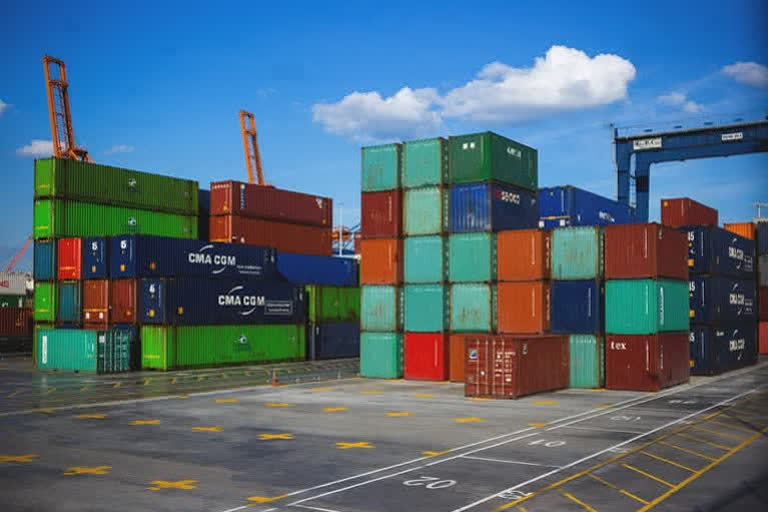New Delhi: In order to arrest a steep decline in the country's exports this year and with the aim to achieve the target of global trade of $2 trillion in the next five years, Indian exporters have sought tax relief on overseas marketing expenses, the expenses incurred on research and development of products for overseas markets, and also a tax dispute resolution scheme for customs and DGFT related disputes on the lines of Sabka Vishwas scheme for indirect taxpayers in their budget wishlist.
In a pre-budget meeting with the finance ministry officials, export industry representatives Saturday demanded a double tax deduction scheme for incurring international marketing expenses.
“Overseas marketing is a big challenge for exporters as it entails a very high cost. We need to bring a “Double Tax Deduction Scheme for Internationalization” to allow exporters to deduct against their taxable income, twice the qualifying expenses incurred for approved overseas activities,” said Sharad Kumar Saraf, President of Federation of Indian Exports Organisations.
The exporter's body suggested putting a cap of $5,00,000 under the scheme so that the investment and tax deductions are limited.
India’s exports have been heavily dented due to global supply chain disruptions caused by the outbreak of Covid-19 global pandemic which has killed more than 1.6 million people worldwide in less than a year after the first case was reported from Wuhan region of China in November 2019.
According to the latest official data, India’s export in the month of November declined by 8.74%, from $25.77 billion in November 2019 to $23.52 billion in November 2020.
Experts blamed supply-side disruptions, low demand for refined petroleum products and engineering goods in other countries, and a sharp reduction in crude prices behind the fall in exports in November.
However, more than the fall in exports in November, the overall decline in the country’s exports in the first eight months of this fiscal (April-November period), is a bigger reason for worry.
READ: Govt must indemnify vaccine makers against all lawsuits: Adar Poonawalla
India’s overall exports (both merchandise and services) registered a decline of over 14% during the April-November period in the current fiscal. While merchandise export declined by nearly 18%, services export by over 8.5% during this period.
In order to arrest this declining trend, the FIEO demanded an increase in the budget for market access initiative (MAI) operated by the ministry of commerce, asking the government to create an export development fund (EDF) equal to half a per cent of the country’s export for helping the small and medium companies.
In addition to income tax deduction on overseas marketing expenses, exporters also demanded amendment in the section 35(2AB) of the Income Tax Act to cover the tax deduction on product development expenses. The existing section covers tax deduction on research and development but not on product development, they said.
“The tax deduction on R&D expenditure which has come down from 200% to 100% now may be restored to its original position as R&D investment in India is extremely low,” Saraf said in a statement sent to ETV Bharat.
Lower income tax rates
While welcoming the Modi government’s decision to reduce the corporate tax rate in September last year, exporters demanded that the new corporate tax rate should also be extended to non-corporate entities such as proprietorship, partnership firms and LLPs, covering both existing as well as newly formed entities.
READ: Petrol, diesel prices hold for 12 days even as crude rises over $52/b
Deemed export status for global tenders
In the interaction with the finance minister, Saraf also advocated deemed export status for Indian companies if they win a global tender.
“Indian companies winning contracts under the Global tender may be accorded deemed exports status, since they substitute direct import which would have taken place if the contract had been won by a foreign supplier,” Saraf told the finance ministry officials.
Tax dispute resolution scheme
Encouraged by the two tax dispute schemes launched by Prime Minister Modi’s government for direct and indirect taxpayers, Sabka Vishwas and Vivad se Vishwas scheme for indirect and direct taxpayers respectively, exporters also demanded a tax dispute resolution scheme for customs and DGFT related tax disputes.
“There are a large number of cases of exporters pending settlement with Customs and DGFT pertaining to classification disputes, duty drawback, export obligation under advance EPCG and EOUs,” Saraf said adding that the waiver of interest and penalty, including duty liabilities, will help those sectors who are passing through a rough patch due to low demand due to the pandemic.
“Introducing such a scheme will help a large number of exporters to regularise their cases,” said the FIEO.
In their budget wish-list, exporters also demanded more support for the manufacturing sector, new initiatives to tap the potential of medical tourism and concerted efforts to minimise the shipping cost for Indian exporters.
India’s outward remittances on account of transport services have gone up in the last three years, from $57 billion in 2017 to $65 billion in 2018 and $67 billion in 2019.
Industry representatives fear that the transportation bill will go up to $150-200 billion in the next few years if Indian exporters continue to rely on foreign shipping companies as the state-owned Shipping Corporation of India is not able to cater to the huge shipping requirements.
“While we need to strengthen Shipping Corporation of India, new large shipping companies may also be set up in India to exploit the ready market available to them,” said the FIEO.
In their budget wish-list, exporters also demanded refund of GST to foreign tourists at the airport itself as a provision was made in the IGST Act but has not yet been operationalised.
Saraf also demanded implementation of Nirvik scheme to ensure easy availability of bank finance for exporters as the scheme announced by the government last year remained non-operational.
READ: Sensex, Nifty open marginally higher, scale fresh intra-day records



